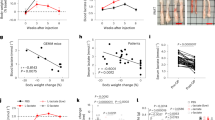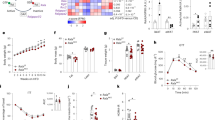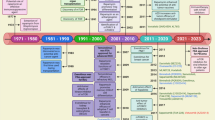Abstract
Because malignant cells have altered, usually accelerated, energy consumption, targeting metabolic signaling represents a prevailing strategy for tumor therapy. Phosphoinositide-dependent kinase 1 (PDK1) is a proximal signaling molecule of phosphatidylinositol 3-kinase, which is required for metabolic activation. It is still lacking definitive evidence whether inactivation of PDK1 can overwhelm tumorigenesis in vivo. Herein we revealed that mammary-specific ablation of PDK1 could delay tumor initiation, progression and metastasis in a spontaneous mouse tumor model. We also demonstrated that inducible deletion of PDK1 could noticeably shrink the growing breast tumors. However, a small portion of PDK1-deficient tumorigenic cells eventually established tumor lesions, albeit at a relatively later phase, most likely owing to compensatory upregulation of extracellular signal–regulated kinase 1/2 (Erk1/2) phosphorylation. Consequently, simultaneous inhibition of PDK1 and Erk1/2 impeded the survival of breast cancer cells. Thus we identify PDK1 as a potential therapeutic target for breast cancer, particularly in combination with an Erk1/2 inhibitor.
This is a preview of subscription content, access via your institution
Access options
Subscribe to this journal
Receive 50 print issues and online access
$259.00 per year
only $5.18 per issue
Buy this article
- Purchase on Springer Link
- Instant access to full article PDF
Prices may be subject to local taxes which are calculated during checkout







Similar content being viewed by others
References
Cairns RA, Harris IS, Mak TW . Regulation of cancer cell metabolism. Nat Rev Cancer 2011; 11: 85–95.
Schulze A, Harris AL . How cancer metabolism is tuned for proliferation and vulnerable to disruption. Nature 2012; 491: 364–373.
Emerling BM, Akcakanat A . Targeting Pi3k/Mtor signaling in cancer. Cancer Res 2011; 71: 7351–7359.
Wullschleger S, Loewith R, Hall MN . Tor signaling in growth and metabolism. Cell 2006; 124: 471–484.
Samuels Y, Wang Z, Bardelli A, Silliman N, Ptak J, Szabo S et al. High frequency of mutations of the Pik3ca gene in human cancers. Science 2004; 304: 554.
Pazarentzos E, Giannikopoulos P, Hrustanovic G St, John J, Olivas VR, Gubens MA et al. Oncogenic activation of the Pi3-kinase P110beta isoform via the tumor-derived Pik3cbeta kinase domain mutation. Oncogene 2015, e-pub ahead of print 18 May 2015; doi:10.1038/onc.2015.173.
Di Nicolantonio F, Arena S, Tabernero J, Grosso S, Molinari F, Macarulla T et al. Deregulation of the Pi3k and Kras signaling pathways in human cancer cells determines their response to everolimus. J Clin Invest 2010; 120: 2858–2866.
Elkabets M, Vora S, Juric D, Morse N, Mino-Kenudson M, Muranen T et al. Mtorc1 inhibition is required for sensitivity to Pi3k P110alpha inhibitors in Pik3ca-mutant breast cancer. Sci Transl Med 2013; 5: 196ra199.
Hennessy BT, Smith DL, Ram PT, Lu YL, Mills GB . Exploiting the Pi3k/Akt pathway for cancer drug discovery. Nat Rev Drug Discov 2005; 4: 988–1004.
Faivre S, Kroemer G, Raymond E . Current development of Mtor inhibitors as anticancer agents. Nat Rev Drug Discov 2006; 5: 671–688.
Park WS, Heo WD, Whalen JH, O'Rourke NA, Bryan HM, Meyer T et al. Comprehensive identification of Pip3-regulated Ph domains from C. Elegans to H. Sapiens by model prediction and live imaging. Mol Cell 2008; 30: 381–392.
Bayascas JR, Pdk1 . The major transducer of Pi 3-kinase actions. Curr Top Microbiol Immunol 2010; 346: 9–29.
Sarbassov DD, Guertin DA, Ali SM, Sabatini DM . Phosphorylation and regulation of Akt/Pkb by the Rictor-Mtor complex. Science 2005; 307: 1098–1101.
Pullen N, Dennis PB, Andjelkovic M, Dufner A, Kozma SC, Hemmings BA et al. Phosphorylation and activation of P70s6k by Pdk1. Science 1998; 279: 707–710.
Lin HJ, Hsieh FC, Song H, Lin J . Elevated phosphorylation and activation of Pdk-1/Akt pathway in human breast cancer. Br J Cancer 2005; 93: 1372–1381.
Maurer M, Su T, Saal LH, Koujak S, Hopkins BD, Barkley CR et al. 3-Phosphoinositide-dependent kinase 1 potentiates upstream lesions on the phosphatidylinositol 3-kinase pathway in breast carcinoma. Cancer Res 2009; 69: 6299–6306.
Xie Z, Zeng X, Waldman T, Glazer RI . Transformation of mammary epithelial cells by 3-phosphoinositide- dependent protein kinase-1 activates beta-catenin and C-myc, and down-regulates caveolin-1. Cancer Res 2003; 63: 5370–5375.
Zeng X, Xu H, Glazer RI . Transformation of mammary epithelial cells by 3-phosphoinositide-dependent protein kinase-1 (Pdk1) is associated with the induction of protein kinase Calpha. Cancer Res 2002; 62: 3538–3543.
Nagashima K, Shumway SD, Sathyanarayanan S, Chen AH, Dolinski B, Xu YY et al. Genetic and pharmacological inhibition of Pdk1 in cancer cells characterization of a selective allosteric kinase inhibitor. J Biol Chem 2011; 286: 6433–6448.
Raimondi C, Maffucci T, Potter BVI, Falasca M . A novel and selective Pdk1 inhibitor reduces breast cancer cell invasion and tumour growth. Breast Cancer Res 2010; 12: S3–S3.
Gagliardi PA, di Blasio L, Orso F, Seano G, Sessa R, Taverna D et al. 3-Phosphoinositide-dependent kinase 1 controls breast tumor growth in a kinase-dependent but Akt-independent manner. Neoplasia 2012; 14: 719–731.
Liu Y, Wang J, Wu M, Wan W, Sun R, Yang D et al. Down-regulation of 3-phosphoinositide-dependent protein kinase-1 levels inhibits migration and experimental metastasis of human breast cancer cells. Mol Cancer Res 2009; 7: 944–954.
Steck PA, Pershouse MA, Jasser SA, Yung WKA, Lin H, Ligon AH et al. Identification of a candidate tumour suppressor gene, Mmac1, at chromosome 10q23.3 that is mutated in multiple advanced cancers. Nat Genet 1997; 15: 356–362.
Cairns P, Okami K, Halachmi S, Halachmi N, Esteller M, Herman JG et al. Frequent inactivation of Pten/Mmac1 in primary prostate cancer. Cancer Res 1997; 57: 4997–5000.
Zhang HY, Liang F, Jia ZL, Song ST, Jiang ZF . Pten mutation, methylation and expression in breast cancer patients. Oncol Lett 2013; 6: 161–168.
Halachmi N, Halachmi S, Evron E, Cairns P, Okami K, Saji M et al. Somatic mutations of the Pten tumor suppressor gene in sporadic follicular thyroid tumors. Genes Chromosomes Cancer 1998; 23: 239–243.
Bayascas JR, Leslie NR, Parsons R, Fleming S, Alessi DR . Hypomorphic mutation of Pdk1 suppresses tumorigenesis in Pten(+/-) mice. Curr Biol 2005; 15: 1839–1846.
Scortegagna M, Ruller C, Feng Y, Lazova R, Kluger H, Li JL et al. Genetic inactivation or pharmacological inhibition of Pdk1 delays development and inhibits metastasis of Braf(V600e)::Pten(-/-) melanoma. Oncogene 2014; 33: 4330–4339.
Ellwood-Yen K, Keilhack H, Kunii K, Dolinski B, Connor Y, Hu K et al. Pdk1 attenuation fails to prevent tumor formation in Pten-deficient transgenic mouse models. Cancer Res 2011; 71: 3052–3065.
Fyffe C, Falasca M . 3-Phosphoinositide-dependent protein kinase-1 as an emerging target in the management of breast cancer. Cancer Manag Res 2013; 5: 271–280.
Guy CT, Cardiff RD, Muller WJ . Induction of mammary tumors by expression of polyomavirus middle T oncogene: a transgenic mouse model for metastatic disease. Mol Cell Biol 1992; 12: 954–961.
Qiu TH, Chandramouli GV, Hunter KW, Alkharouf NW, Green JE, Liu ET . Global expression profiling identifies signatures of tumor virulence in Mmtv-Pymt-transgenic mice: correlation to human disease. Cancer Res 2004; 64: 5973–5981.
Kim MS, Lee EJ, Kim HR, Moon A . P38 kinase is a key signaling molecule for H-Ras-induced cell motility and invasive phenotype in human breast epithelial cells. Cancer Res 2003; 63: 5454–5461.
Roberts PJ, Der CJ . Targeting the Raf-Mek-Erk mitogen-activated protein kinase cascade for the treatment of cancer. Oncogene 2007; 26: 3291–3310.
Mora A, Davies AM, Bertrand L, Sharif I, Budas GR, Jovanovic S et al. Deficiency of Pdk1 in cardiac muscle results in heart failure and increased sensitivity to hypoxia. EMBO J 2003; 22: 4666–4676.
Ito K, Akazawa H, Tamagawa M, Furukawa K, Ogawa W, Yasuda N et al. Pdk1 coordinates survival pathways and beta-adrenergic response in the heart. Proc Natl Acad Sci USA 2009; 106: 8689–8694.
Saitoh M, Pullen N, Brennan P, Cantrell D, Dennis PB, Thomas G . Regulation of an activated S6 kinase 1 variant reveals a novel mammalian target of rapamycin phosphorylation site. J Biol Chem 2002; 277: 20104–20112.
Thiery JP, Sleeman JP . Complex networks orchestrate epithelial-mesenchymal transitions. Nat Rev Mol Cell Biol 2006; 7: 131–142.
Xie Z, Yuan H, Yin Y, Zeng X, Bai R, Glazer RI . 3-Phosphoinositide-dependent protein kinase-1 (Pdk1) promotes invasion and activation of matrix metalloproteinases. BMC Cancer 2006; 6: 77.
Rodriguez-Viciana P, Collins C, Fried M . Polyoma and Sv40 proteins differentially regulate Pp2a to activate distinct cellular signaling pathways involved in growth control. Proc Natl Acad Sci USA 2006; 103: 19290–19295.
Altomare DA, Testa JR . Perturbations of the Akt signaling pathway in human cancer. Oncogene 2005; 24: 7455–7464.
Dennis MD, Kimball SR, Jefferson LS . Mechanistic target of rapamycin complex 1 (Mtorc1)-mediated phosphorylation is governed by competition between substrates for interaction with Raptor. J Biol Chem 2013; 288: 10–19.
Cope CL, Gilley R, Balmanno K, Sale MJ, Howarth KD, Hampson M et al. Adaptation to Mtor kinase inhibitors by amplification of Eif4e to maintain cap-dependent translation. J Cell Sci 2014; 127: 788–800.
Zhang XB, Li XR, Zhang J . current status and future perspectives of Pi3k and Mtor inhibitor as anticancer drugs in breast cancer. Curr Cancer Drug Targets 2013; 13: 175–187.
Gulhati P, Bowen KA, Liu J, Stevens PD, Rychahou PG, Chen M et al. Mtorc1 and Mtorc2 regulate Emt, motility, and metastasis of colorectal cancer via Rhoa and Rac1 signaling pathways. Cancer Res 2011; 71: 3246–3256.
Lamouille S, Derynck R . Cell size and invasion in Tgf-beta-induced epithelial to mesenchymal transition is regulated by activation of the Mtor pathway. J Cell Biol 2007; 178: 437–451.
Mikaelian I, Malek M, Gadet R, Viallet J, Garcia A, Girard-Gagnepain A et al. Genetic and pharmacologic inhibition of mtorc1 promotes emt by a Tgf-beta-independent mechanism. Cancer Res 2013; 73: 6621–6631.
Hoeflich KP, O'Brien C, Boyd Z, Cavet G, Guerrero S, Jung K et al. In vivo antitumor activity of Mek and phosphatidylinositol 3-kinase inhibitors in basal-like breast cancer models. Clin Cancer Res 2009; 15: 4649–4664.
Gee JM, Robertson JF, Ellis IO, Nicholson RI . Phosphorylation of Erk1/2 mitogen-activated protein kinase is associated with poor response to anti-hormonal therapy and decreased patient survival in clinical breast cancer. Int J Cancer 2001; 95: 247–254.
O'Neil RG, Wu L, Mullani N . Uptake of a fluorescent deoxyglucose analog (2-Nbdg) in tumor cells. Mol Imaging Biol 2005; 7: 388–392.
Acknowledgements
We thank Dr Dario R Alessi (University of Dundee) for sharing the PDK1fl/fl mice. This work was supported by grants to Dr Zhongjun Dong’s laboratory from Natural Science Foundation of China (81322041, 81273198, 81361128016 and 81471523), Minister of Science and Technology of China (2013CB944901) and Beijing Natural Science Foundation (5132018). Juan Du and Meixiang Yang were supported by Postdoctoral Foundation at Tsinghua-Peking Center for Life Sciences.
Author contributions
Juan Du, Meixiang Yang, Shasha Chen and Dan Li performed and analyzed the experiments; Zai Chang provided critical reagents and advice; Juan Du, Meixiang Yang and Zhongjun Dong conceived the research, analyzed data and wrote the manuscript.
Author information
Authors and Affiliations
Corresponding author
Ethics declarations
Competing interests
The authors declare no conflict of interest.
Additional information
Supplementary Information accompanies this paper on the Oncogene website
Supplementary information
Rights and permissions
About this article
Cite this article
Du, J., Yang, M., Chen, S. et al. PDK1 promotes tumor growth and metastasis in a spontaneous breast cancer model. Oncogene 35, 3314–3323 (2016). https://doi.org/10.1038/onc.2015.393
Received:
Revised:
Accepted:
Published:
Issue Date:
DOI: https://doi.org/10.1038/onc.2015.393
This article is cited by
-
NNAT is a novel mediator of oxidative stress that suppresses ER + breast cancer
Molecular Medicine (2023)
-
Development of phosphoinositide 3-kinase delta (PI3Kδ) inhibitors as potential anticancer agents through the generation of ligand-based pharmacophores and biological screening
Medicinal Chemistry Research (2023)
-
Pharmacological disruption of the MTDH–SND1 complex enhances tumor antigen presentation and synergizes with anti-PD-1 therapy in metastatic breast cancer
Nature Cancer (2021)
-
Imaging Cobalamin Uptake within Malignant Breast Tumors In Vivo
Molecular Imaging and Biology (2019)
-
Expression of PDK1 in malignant pheochromocytoma as a new promising potential therapeutic target
Clinical and Translational Oncology (2019)



